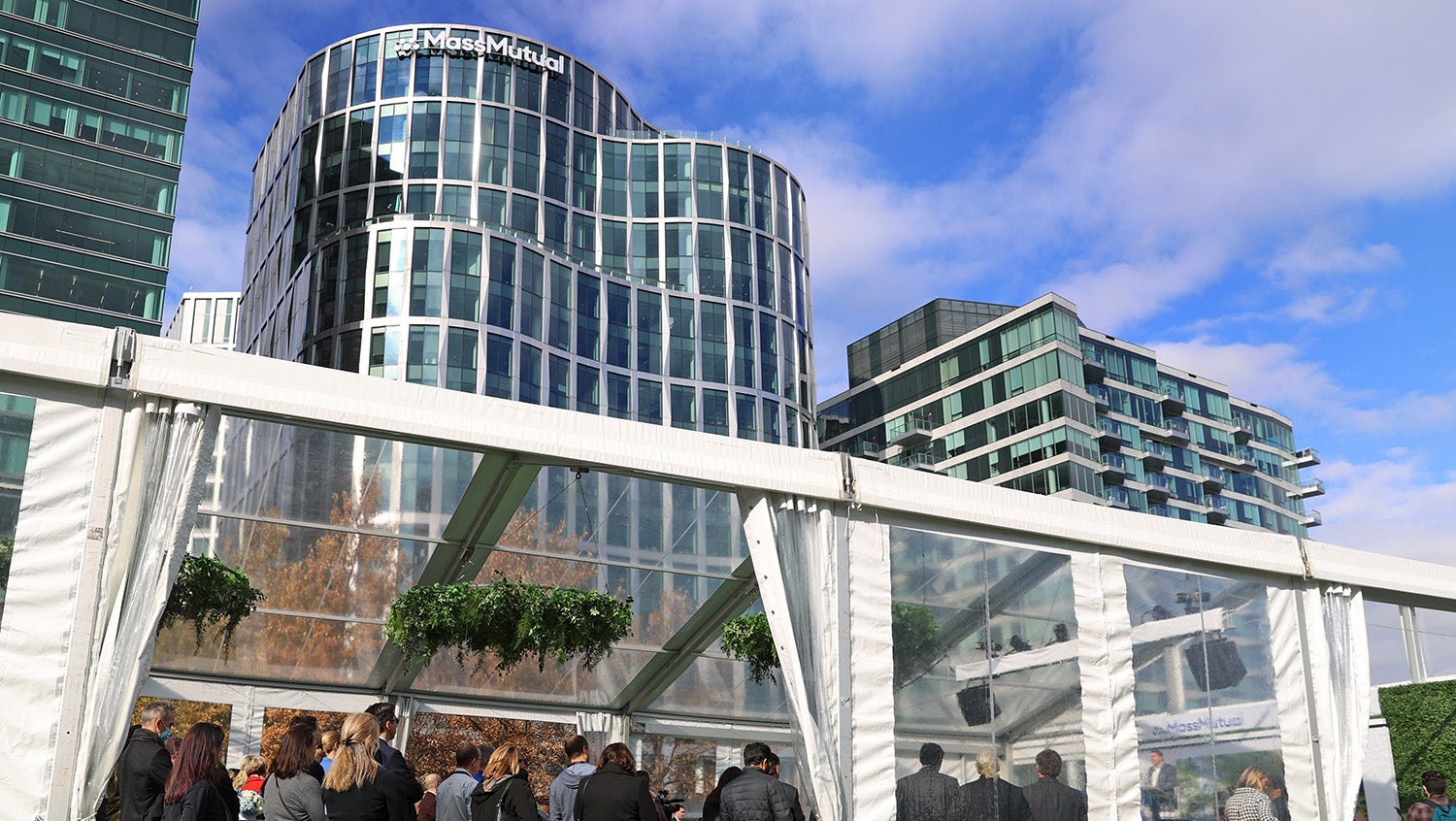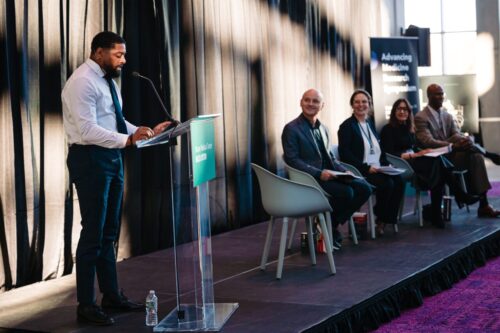MassMutual Is Making the Business Case for Advancing Health Equity
December 23, 2021

Boston Globe, Getty Images
With its partnership with Boston Medical Center, MassMutual Foundation believes that serving its community also best serves its employees and company as a whole.
At first glance, it may not seem like an obvious partnership: MassMutual, an insurance corporation, and Boston Medical Center, a safety-net hospital. But digging deeper, Dennis Duquette, the head of Community Responsibility at MassMutual, is confident that its investment into BMC is a near perfect alignment, a meeting of the minds. It has been since 2019, when the two organizations first joined forces to address the socioeconomic concerns of the Boston community.
With the launch of the Health Equity Accelerator, MassMutal Foundation—the philanthropic arm of MassMutual—is reinvesting with BMC to help support the hospital’s new endeavor to close health equity gap.
Duquette spoke with HealthCity about why MassMutual Foundation is excited about its work with BMC and about corporate engagement, responsibility, and philanthropy writ large. Not only is investing in the community a benefit to local neighborhoods, but it is a net positive for the corporations and businesses as well—in fact, in our current day, it’s practically essential.
HealthCity: Your role at MassMutual is head of Community Responsibility, and president of the MassMutual Foundation. Can you explain what that means and your responsibilities?
Dennis Duquette: Community Responsibility at MassMutual is what’s classically known as corporate social responsibility and/or community relations. More recently, many people are talking about ESG—environmental, social, and corporate governance. We’re focused on the social component. Our team conceives the community engagement strategy, drives the implementation of that strategy through proprietary programming and funding, and works to assess the impact of our efforts.
It’s traditional things: program support, employee and associate volunteering programs, and all of the programming intended to get our associates engaged in the community, whether it’s through volunteering, through matching gift programs, or other means.
I feel like we’ve really pivoted and started to take a different tack around how we approach philanthropy. And, BMC is a perfect example of that.
The MassMutual Foundation is the philanthropic arm of our organization through which we support nonprofits. Our goal is to create and foster connections in struggling communities so that members of that community can access the resources they need to thrive. It’s critical that we drive impact that is sustainable and helps individuals and communities get the solutions to the challenges they face day in and day out.
HealthCity: Can you explain how that focus has aligned with a partnership with Boston Medical Center?
DD: We continue to be excited about the work that BMC is doing, now with the Health Equity Accelerator. When I first toured Boston Medical Center, I was so impressed to find in-house services such as financial counseling, programs for first-time mothers, the food pantry, and programs for housing assistance—all of these services are being aggregated within the hospital. BMC is building an ecosystem that creates those connections for people who are accessing your hospital for their healthcare. Essentially, this mirrors our approach in our community-based work, so to see it come together under the auspices of BMC was amazing.
We’ve found that in order to help someone find a path to financial wellbeing, it can be very challenging if they don’t know where their next meal’s coming from, or they don’t know how they’re going to get to work, or they don’t have a stable roof over their head. They’re not going to have the time to sit down and think about, for example, “Well, how do I do a budget?” That’s just not going to happen and can’t happen until the basics are taken care of. And so, that notion of the connections that are made within communities—and in this case, within the BMC community—that’s something we believe is really instrumental to helping those in need for the long term.
HC: Taking that step back, from a higher level, what is the role of businesses or corporations in investing in the community?
DD: It’s so important. First of all, there is a growing expectation that corporations need to do more and step up in ways that are meaningful, that have breadth and depth. I get that. From a business standpoint, it’s good business because it’s important to consumers, it’s important to our employees, it’s important to potential employees, to all sorts of stakeholders for corporations to be doing something constructive.
Second, there is a lot of expertise, knowledge, and skill within corporations that really, up until recent memory, has gone untapped in order to deal with societal problems. Clearly, government can’t do it all—they just can’t. Some of the best and most well intended public policies sometimes fall short because they weren’t implemented correctly, through no individual’s fault. We all have a stake in this, so of course corporations should step up. And that’s why I think it’s important for companies to do, first of all, to do what’s right by the company, but also do something that’s meaningful, to really grow and build that sustainable impact that I think corporations have a unique opportunity to do.
HC: I don’t think this is cynical to say, but there is likely a benefit to the business or corporation to be involved in meaningful philanthropic efforts, as well. What would you say to another company that is hesitant about investing in the community?
DD: First of all, at a very macro level, there’s a quality-of-life issue. If you are invested in your community, pinpointing specific problems in the community, and working to help solve those—or help others solve those through your funding or other efforts—you are improving the quality of life in the community where your customers and employees live.
From a bottom-line standpoint, it is important for your business to be a company that cares. And in terms of employees, it can be a tremendous contributor to positive employee morale and retention.
Second, there’s what we talked about with brand and business reputation—these efforts reflect very well there. The number just keeps going up year over year, the percentage of people who make purchase decisions based on how socially engaged a company might be. It’s not the only factor, of course, but it plays a big role in a consumer’s decision-making, and it’s growing in significance. So, from a bottom-line standpoint, it is important for your business to be a company that cares. And in terms of employees, it can be a tremendous contributor to positive employee morale and retention.
HC: How does a company make decisions about what philanthropy or community nonprofits they should be investing in?
DD: The company gets to decide; you don’t have to take your marching orders from the market. It’s very important that how a company shows up in the community should track with their business, who they are as a company, and their culture. Because if it doesn’t? Then, you run the risk of it looking incongruent with the company’s image, which consumers and other stakeholders can spot fairly easily. Authenticity is very important.
HC: You mention employee expectations of a company’s philanthropic efforts. That seems to be something that has grown over the last generation. Can you talk more about what you’ve seen from employees, especially talking about that ‘phony’ piece?
DD: It is obviously growing in intensity in terms of expectations. Our challenge, for my team, is to do everything that we can within our power to educate and engage our employees so that they understand what our strategy is, and why our strategy is what it is, and how they themselves can become engaged. And our strategy is really predicated on who we are as a company.
On the flip side of that, we’re working more closely with our HR group to understand how what we do is impacting employee satisfaction overall. So, through the employee surveys that we do, we really want to view the work that we’re doing and the opportunities we’re providing in the context of the overall experience that employees are having at Mass Mutual. Employees are essential to our success.
We’ve found that our employees care about [philanthropy] as part of their employee satisfaction. And a lot of new hires or potential hires are making employment decisions based on it—that has definitely been growing in prevalence in the talent acquisition side of a business.
HC: Going back to making the business case for philanthropy, do you see this same decision-making around whether to work with MassMutual based on company culture from other businesses?
DD: Yes, and for example, I’m working on a project now where we are codifying language around our corporate culture, our community engagement, our ESG posture, sustainability—all of that. It is becoming more and more consistently asked for by institutions and individuals seeking to do business with us in a sales environment, in a vendor relationship, etc.
These prospects want to know, “Well, what do you stand for as a company?” That is becoming vital; it’s all around us. I think any company would be silly to ignore it.


